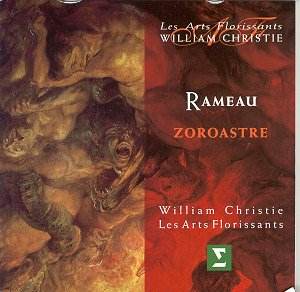When Rameau's 'Zoroastre' was first performed
in 1749, at the Academie Royale de Musique (the Paris Opera),
Rameau was at the height of his powers and his music dominated
the Paris Opera stage. 'Zoroastre' was given a spectacular production
and was performed by a stellar cast, but it only ran for a respectable
25 performances. This remarkably direct work had a number of aspects
that disturbed the conservative operatic tastes of the time. There
was no prologue glorifying the King, the opera plunged straight
into the action. This action derived from ancient Persian rather
than classical myth or medieval romance. The plot presented a
power struggle between good and evil and concentrated almost exclusively
on the principal characters, Zoroastre the religious reformer,
a devotee of Ahura Mazda (the Supreme Being) and Abramane, an
ambitious sorcerer and servant of Ahriman (the Spirit of Evil).
When the opera was revived in 1756, composer
and librettist revised the work thoroughly. Acts 2, 3 and 5 were
substantially recast and the two main female characters were given
far stronger roles, their romantic entanglements forming a greater
feature of the plot in this version. But even with the revisions,
'Zoroastre' remains a remarkably direct ‘tragédie en musique’.
This directness may be partly explained by the
libretto, where Louis de Cahusac uses the work as a didactic platform
to propound ideas related to Freemasonry. Quite how many of these
Masonic elements appealed to Rameau is open to debate. But he
took advantage of Cahusac's clear-cut, dramatic plot to write
music of great variety and power. The struggle between good and
evil is reflected in the voice types of the protagonists as Zoroastre
(here played by Mark Padmore) is a high voiced haute-contre and
Abramene (Nathan Berg) is a deep bass. Rameau's rich soundworld
is put to good use as the action varies from tender love scenes
between Zoroastre and his beloved Amelite (Gaelle Mechaly) to
the demonic incantations of Abramane, Erinice (Anna Maria Panzarella)
and their hordes.
From the opening notes of the overture you know
you are in good hands. Its dramatic opening, depicting Abramane's
barbarous rule, is played arrestingly by Les Arts Florissants
under William Christie. Christie relishes all the detail of this
music, but his attention to detail never causes the music to falter;
it flows ever onward. This is to great advantage in a work like
'Zoroastre' where Rameau increasingly blurs the distinction between
recitative and aria so that each act becomes one single flow.
As Zoroastre, Mark Padmore is ideally cast and
his flexible tenor never sounds strained in this stratospheric
music. He is at his best in the love scenes with Amelite, where
his plangent tenor fits the music beautifully. Given the scarcity
of singers able to bring off these taxing haute-contre parts,
it is perhaps churlish to complain, but in the more dramatic scenes
I felt that his tone was lacking in brilliance. As his beloved,
Amelite, Gaelle Mechaly has little to do but sound ravishing.
She is one of those slightly flat operatic characters to whom
things happen. But in her love scenes, she combines with Mark
Padmore in a truly melting manner.
As Abramane, Nathan Berg certainly chews the
scenery. Rameau gives Abramane much dramatic music and Berg relishes
it. As the more equivocal Erinice, Anna Maria Panzarella lacks
an element of steel that I felt would be suitable for this character,
though she sings the music superbly.
As is to be expected in a performance from this
source, all the cast sing and ornament the music with wonderful
style. Whilst not all the solo voices are of the first order,
their sense of musical style is impeccable. Everyone contributes
in a way that makes it seem as if they have been singing this
music all their lives. This is something that we now rather take
for granted, but it is due to the work of William Christie and
Les Arts Florissants that we now understand and appreciate French
music of this period.
With an orchestra of fifty and a chorus of twenty-five,
Les Arts Florissants are the real heroes of the opera. Rameau
is at his most inventive in creating different soundworlds for
the two opposing forces and both orchestra and chorus never fail
to do justice to Rameau's inventions. Oromases (Eric Martin Bonnet),
the King of the Genies and a supporter of Zoroastre, is always
supported by a halo of double-stopped strings. But the forces
of Darkness rather get all the best tunes. Rameau's use of divided
bassoons and divided lower strings provides some astonishing textures
which Christie and Les Arts Florissants tackle with relish. Christie's
handling of the opera is exemplary; his pacing is frequently swift
but never rushed. He displays a fine understanding of the structure
of Rameau's wonderfully flexible scenes.
The recording is based on a series of live performances
that Les Arts Florissants gave. For these live performances, a
number of the dances were cut. But Christie includes them in an
appendix on the set.
'Zoroastre' has been recorded once before, by
Sigiswald Kuijken on Deutsche Harmonia Mundi in 1984 with John
Elwes in the title role, but this version is apparently not currently
available. Both Kuijken and Christie have chosen the 1756 version
as the basis for their performances. Whilst I can understand their
wish to record the composer's final thoughts, it would be fascinating
to hear what the even more revolutionary 1749 version sounds like.
Robert Hugill
